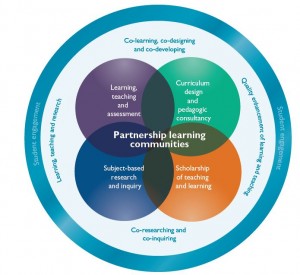
The e-Learning Ecologies MOOC: Week 3 Question
Make a post introducing an active knowledge making concept. Define the concept and provide at least 1 example of the concept in practice. Be sure to add links or other references and images or other media to illustrate your point. If possible, select a concept that nobody has addressed yet so we get a well-balanced view of active knowledge making. Active knowledge making concepts might include:
Project-based learning; Inquiry learning; Authentic pedagogy; Progressive education; New learning/transformative learning; Participatory learning; Gamification; Prosumers; Knowledge society/economy; Learning for innovation/creativity; Research-based learning; Online project spaces; Makerspaces; or suggest a concept in need of definition!
My Response
Week 3 of the e-Learning Ecologies MOOC now draws its attention to the second of the seven “e-affordances”: active knowledge making. I am reminded by a comment made by Dr William Cope at the beginning of the course where he notes that some of these “e-affordances”, as concepts, have been around for some time. It is here that I want to introduce the concept of Partners in Learning, which is a philosophy and a set of values that my institution wishes to underpin across all of its’ learning, teaching, research, assessment and student engagement activities and processes. The Partners in Learning concept and, indeed, the notion of active knowledge making, itself, draws upon an enterprise that emerge over 200 years ago from Humboldt’s notions of the modern university and that of “organic scholarship”:
The relationship between teacher and learner is … completely different in higher education from what it is in schools. At the higher level, the teacher is not there for the sake of the student, both have their justification in the service of scholarship. (von Humboldt, 1970, [1810])
My institution is not the only Higher Education Institution (HEI) in the United Kingdom (UK) embarking upon “partners in learning” style projects. A number of initiatives, funding opportunities and campaigns have stemmed from the UK’s Higher Education Academy (HEA) and the National Union of Students (NUS) to try and promote student engagement through partnership (Dunne & Zandstra, 2011; Neary & Winn, 2009; NUS, 2012; HEA, 2014; Healey, Flint & Harrington, 2014). The NUS has been quite vociferous in “rejecting the student as consumer model” (NUS, 2012:5) and proposes that:
At its roots partnership is about investing students with the power to co-create, not just knowledge or learning, but the higher education institution itself. (NUS, 2012:8)

A report on behalf of the HEA suggests that the “students as partners” cuts across four broad areas (see Figure 1) in which students can act as partners in learning and teaching:
- learning, teaching and assessment;
- subject-based research and inquiry;
- scholarship of teaching and learning;
- curriculum design and pedagogic consultancy.
Moreover, the report goes further indicating the different types of strands and agendas that the “students as partners” concept touches upon:
Students as partners is a concept which interweaves through many other debates, including assessment and feedback, employability, flexible pedagogies, internationalisation, linking teaching and research, and retention and success. (Healey, Flint & Harrington, 2014:7)
However, whilst it is argued that “all partnership is student engagement”, it is not necessarily the case that “all student engagement is partnership” (ibid., 2014:15). As the HEA and the NUS, in partnership with HEIs, try to make a compelling case for the “student as partners” as a creative enterprise, more prominence is being placed on the importance of presenting “quantifiable information and the achievement of specific outcomes and impacts” (ibid., 2014:10). In the UK, this has taken the form of the National Student Survey (NSS), Key Information Sets (KIS), institutional key performance indicators (KPIs), and the Research Excellence Framework (REF). The challenge, therefore, is how we try and balance these two fundamentally opposing ideologies.
References
Dunne, E. & Zandstra, R. (2011). Students as Change Agents: New ways of engaging with Learning and Teaching in Higher Education. Bristol, England: University of Exeter / ESCalate / The Higher Education Academy. Available at: http://escalate.ac.uk/downloads/8242.pdf [Accessed 7.2.2015].
HEA. (2014). Framework for Partnership in Learning and Teaching in Higher Education. York, England: The Higher Education Academy (HEA). Available at: https://www.heacademy.ac.uk/students-partners-framework-action [Accessed 7.2.2015].
Healey, M., Flint, A. & Harrington, K. (2014). Engagement through Partnership: Students as Partners in Learning and Teaching in Higher Education. York, England: The Higher Education Academy (HEA). Available at: https://www.heacademy.ac.uk/engagement-through-partnership-students-partners-learning-and-teaching-higher-education [Accessed 7.2.2015].
Neary, M. (2010). Student as Producer: Research engaged Teaching and Learning at the University of Lincoln – User’s Guide 2010-11. Lincoln, England: University of Lincoln. Available at: http://studentasproducer.lincoln.ac.uk/files/2010/11/user-guide.pdf [Accessed 7.2.2015].
Neary, M. & Winn, J. (2009). “Student as Producer: Reinventing the Student Experience in Higher Education”. In: Bell, L., Stevenson, H. & Neary, M. (Eds.). The Future of Higher Education: Policy, Pedagogy and the Student Experience. London, England: Continuum.
NUS. (2012). A Manifesto for Partnership. London, England: National Union of Students (NUS). Available at: http://www.nusconnect.org.uk/campaigns/highereducation/partnership/a-manifesto-for-partnerships/ [Accessed 7.2.2015].
von Humboldt, W. (1970, [1810]). “On the spirit and the organizational framework of intellectual institutions in Berlin, in University reform in Germany”. Minerva, 8, pp. 242-250. Available at: http://dx.doi.org/10.1007/BF01553214 [Accessed 7.2.2015].
